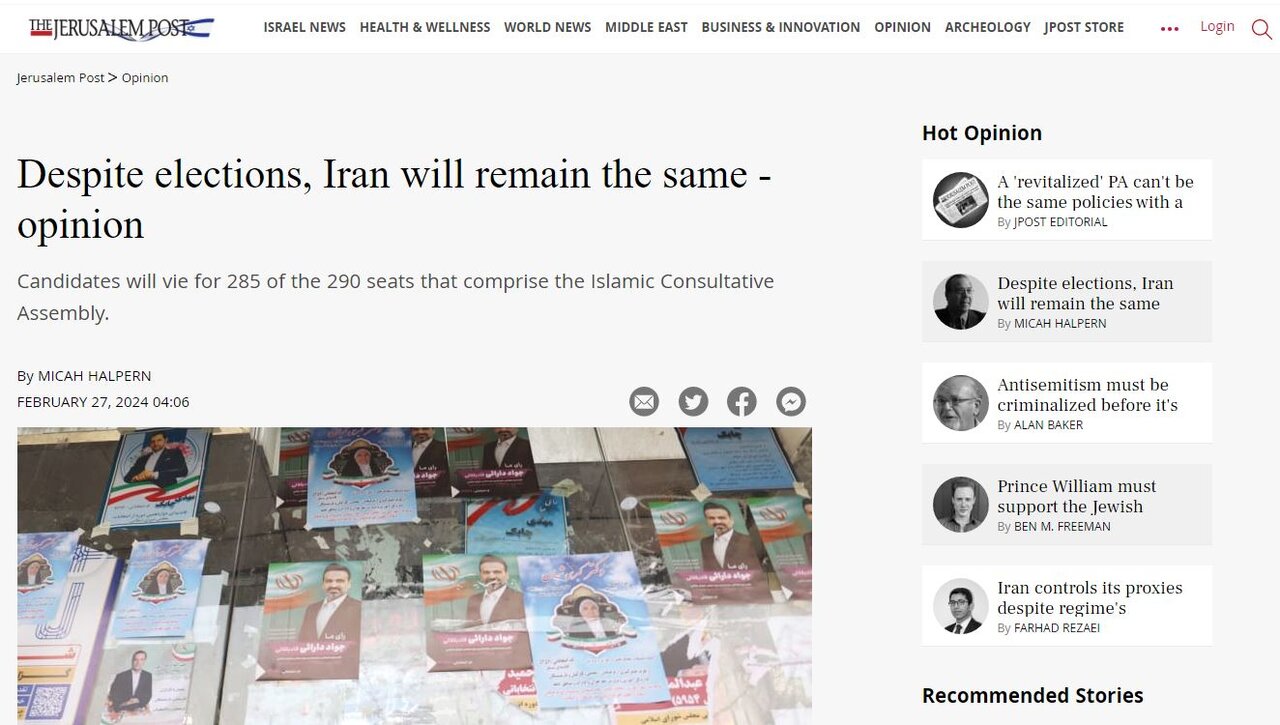Israel's electoral dream

TEHRAN- In a recent editorial piece published by The Jerusalem Post, a concerted effort was made to sow seeds of hopelessness within the Iranian populace, casting doubt on the democratic processes in Iran.
The Israeli newspaper sought to discourage participation in the upcoming parliamentary and Assembly of Experts elections.
Authored by Michan Halpern, the piece asserted that these elections are unlikely to transform Iran into a Western-style democracy. However, this assertion is founded by Halpern’s limited understanding of Iran's political landscape and its people.
Halpern's analysis overlooks the complexities inherent in Iran's electoral system and the diverse aspirations of its citizens. By painting a bleak picture of the electoral outcome, the report seems to undermine the potential for meaningful change within Iran's political framework. Such a perspective fails to acknowledge the role of Iranian voters and their capacity to shape the direction of their country through civic engagement.
Moreover, the editorial's focus on Iran's foreign policy, particularly its stance towards Tel Aviv, demonstrates a narrative of Tel Aviv's worries toward Iran's Israel policy.
Iran's pursuit of Islamic democracy
Halpern's skepticism regarding the existence of democracy in Iran stems from his wrong outlook toward Tehran, where he erroneously applies a Western-centric interpretation of the term "democracy."
In his critique, he overlooks the unique Islamic democracy model embraced by the Islamic Republic of Iran.
Contrary to Halpern's perspective, democracy within Iran is a multifaceted concept rooted in the principles of Islam, governance by the people, and the establishment of a republic. According to the remarks by the leader of the Islamic Revolution on Saturday, the fusion of trust in the republic, the populace, and Islamic values has underpinned the country's stability and progression.
Also, a cursory examination of Iran's electoral framework reveals the active participation of its citizens in shaping both the executive and legislative branches of the country. Iran’s electoral landscape encompasses various tiers, including presidential, parliamentary, and the Assembly of Experts elections, wherein individuals exercise their democratic rights.
During parliamentary elections, candidates vie for 290 seats, while the Assembly of Experts election offers 88 seats for contention. This allocation ensures representation across diverse segments of society, fostering inclusivity within the political sphere.
Moreover, the upcoming March 1 election exemplifies the vibrancy of Iran's political landscape, with a multitude of parties and coalitions fervently competing for public support. The announcement by Iranian Interior Minister Ahmad Vahidi regarding the readiness of 103 parties and 20 electoral coalitions underscores the robust democratic process underway.
In essence, the notion of democracy in Iran transcends Halpern's narrow confines, embodying a dynamic synthesis of Islamic principles and participatory governance.
Decoding allegations of Jerusalem Post against Tehran
The assertions put forth in this report stem from the author's apparent concerns regarding Iran's stance towards Israel.
It is imperative to clarify that Iran's foreign policy is a reflection of its national interests. Like freedom seekers across the globe, the Iranian populace has expressed its disapproval of Israeli onslaught through anti-Israeli demonstrations. Consequently, the country's diplomatic channels routinely condemn Israeli aggression and human rights violations.
Regardless of the outcome of the March 1 election, both the Iranian people and their government will remain steadfast in their support for the oppressed Palestinians. Moreover, they steadfastly remember Israel's hostility towards Iran, including recent terrorist incidents and acts of sabotage orchestrated by Israeli spy agencies.
Another motivation behind this report appears to be an attempt to undermine the forthcoming election in Iran. By forecasting low voter turnout and highlighting divisions between the Iranian populace and its government, the report seeks to dampen enthusiasm and cast doubt on the legitimacy of the electoral process.
Furthermore, the report appears to propagate a narrative of hopelessness, suggesting that Iranians are powerless in shaping the future of their country. This tactic aligns with a broader strategy of soft warfare, aimed at sowing discord and alienating the Iranian people from their government.
Unraveling Jerusalem Post's double standards
The attempt by the Israeli outlet to accuse Iran of lacking democracy is not only hypocritical but also shortsighted.
While scrutinizing Iran's democratic credentials, the outlet conveniently overlooks the ongoing anti-government demonstrations within Israel itself.
For months, thousands of Israelis have taken to the streets to protest the hawkish policies of Israeli Prime Minister Benjamin Netanyahu, particularly concerning the Gaza Strip.
Moreover, it conveniently ignores the global outcry against Tel Aviv's blatant disregard for human rights, particularly in recent months.
The international community has voiced widespread condemnation of Israel's actions, highlighting its egregious violations of human rights in various contexts.
By selectively focusing on Iran's political system while disregarding similar issues within Israel and the international community's condemnation of Israeli policies, the outlet exposes its bias and undermines its credibility.
